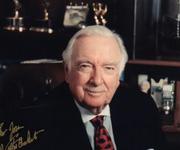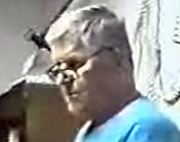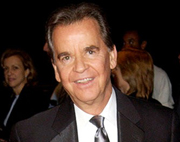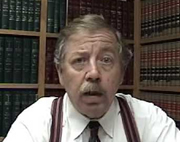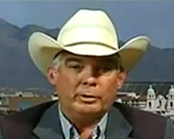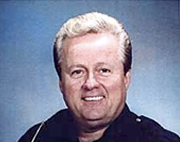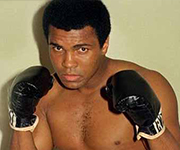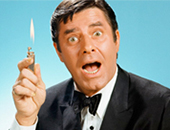The Impeachment of a President
by Brent Johnson
Americans lack a clear understanding of the impeachment process, which is unfortunate and somewhat surprising, considering the fact that President William Jefferson Clinton is facing a trial to determine whether or not he will continue in office.
Impeachment is a political process established by the Founding Fathers and Framers of the Constitution, to ensure that the Office of the President and its occupant maintained the highest legal and moral standards possible. Impeachment is not a criminal process and it does not (nor should it) follow strict rules of criminal prosecutions.
The President of the United States has never been just like other Americans. He is held to a higher standard than ordinary Citizens. He is held to a higher standard than any other public servant or government official. He represents America and so his behavior reflects the character of our country.
Impeachment is a kind of job review, in which the elected Representatives of the people determine whether the sitting President is worthy of holding the highest political office in the land.
Impeachable Offenses
There has been much debate over the past few months on precisely what constitutes an impeachable offense. Congressional democrats insist that such matters are only high crimes, such as treason and bribery, as defined in the Constitution.
Republican Members of the House have come much closer to actual justification for impeachment of a President, though I have yet to hear a correct answer to this important question.
High Crimes
It is very clear from the wording of the Constitution that certain high crimes justify impeaching a President. These include, treason, bribery, and other similar offenses against the American people.
Unfortunately, some congressmen have taken the position that only high crimes or their equivalent justify impeachment. They could not be more wrong.
High crimes are the objective standard for impeachment contained in the Constitution for the United States. But our forefathers were brilliant. They understood that the nature of government is to oppress and control those it is sworn to protect, and that government officials will inevitably attempt to use any powers granted them to further these ends.
Misdemeanors
But the Constitution provides for another standard for impeachable offenses: misdemeanors. There has been much debate about the meaning of this word and herein lies the main dispute as well as the definitive answer to the question of what constitutes an impeachable offense.
In order to understand this the term misdemeanors must first be defined. However, it is ridiculous to look to modern or law dictionaries for the definition of this word, because those definitions did not exist at the time the Constitution was written.
A written document means what it says. This a is a precept in law. So the only question you really need to ask is, what did the word misdemeanor mean at the time it was written? The answer may surprise you.
Mis- is a prefix, meaning bad.
Demeanor means behavior.
Therefore, misdemeanor means bad behavior.
Misdemeanors are the subjective standard by which a President may be impeached.
Our Founders determined that the best way to ensure the high standards of the Office of the President was to give the sitting Congress the power to determine what constituted behavior unbecoming of the Office of the President. This is the subjective, or changing, standard against which presidents are to be measured.
Defining Impeachable Offenses
Many congressional Democrats have loudly demanded that a fixed definition of impeachable offenses be established, supposedly to prevent partisan battles designed to unseat an elected President. However, to do this would compromise the system so carefully erected more than 200 years ago.
If we drew a firm line in the sand and told the President of the United States that he could walk up to by not cross that line, then we would tacitly invite the President to manipulate and thereby circumvent the standards originally established for this highest public office in the land.
Bill Clinton has shown his total disregard for principles, morals and values, by nit-picking around legal definitions of words (i.e. I did not have sexual relations with that woman, etc.). He would rather commit dastardly deeds and then justify them by claiming that they are technically permitted under the law, than to measure the standard for his behavior against the intents of the Framers of our Constitution and our Founding Fathers.
Firmly defining an impeachable offense would forever emasculate the representatives of the people from enforcing subjective standards of behavior. It would take power from the House and place it into the hands of the President.
If the Framers wanted to rigidly define all terms for impeachment, they would have done so.
What is Impeachment?
Despite what you may believe, impeachment is not the equivalent of removing a president from office, but rather only part of that process.
When the House impeaches, they essentially indict the President. As representatives of the people, House Members are charged with determining whether there is sufficient evidence of activities unbecoming the office of the President to issue formal charges against him. These are only charges. He must be found guilty in order to be removed from office.
However, even if an impeached president is not removed from office, he will go down in history as being impeached (e.g. Andrew Johnson).
Trial in the Senate
The role of the Senate in an impeachment trial is widely misunderstood.
Once a president has been impeached by the House, the Senate conducts a trial, following the general procedures for conducting a criminal prosecution. It is here that witnesses may be called to testify, defense attorneys may conduct cross-examinations, etc.
However, the only job of the Senate is to determine whether the President is guilty of the charges brought against him by the House. It is beyond the lawful power of the Senate to decide whether the charges constitute impeachable offenses; that has already been determined by the House.
If the President is found guilty of even one charge that the House has brought against him, then he is removed from office.
A two-thirds majority vote in the Senate is needed to determine guilt. However, Senatorial partisanship is not politically wise, because if the evidence clearly points to a sitting president's guilt and partisan Senators fail to vote accordingly, then they will probably be committing political suicide. This is the fail-safe mechanism our Founders built into the impeachment process.
What About Censure?
There is no option in the Constitution for censuring a president (Andrew Jackson was censured but the censure was subsequently removed). Those who claim that censure would suffice as a punishment for President Clinton because he would be subject to criminal prosecution for his wrongdoing after he leaves office, either do not understand the law they are sworn to uphold and defend, or fail to grasp the simple fact that a president may pardon anyone - including himself - for any crime, except in cases of impeachment.
In other words, without being impeached President Clinton could (and most certainly would) pardon himself for his criminal actions.
Regardless, there is no provision in the Constitution for censuring a president.
Remember that the Constitution is a document of negative authority, meaning that if a power is not specifically authorized by the Constitution, then the federal government does not have that power. It does not work the other way around, though some Democratic Members of Congress would have you believe otherwise.
Impeaching a president is a very serious matter. It should not be done lightly, but it should not be avoided when the sitting president's actions, or failing to hold him accountable for them, threaten to undermine the stature of the Office of the President. When that occurs, impeachment is the necessary and only course of action available to Congress.
Americans lack a clear understanding of the impeachment process, which is unfortunate and somewhat surprising, considering the fact that President William Jefferson Clinton is facing a trial to determine whether or not he will continue in office.
Impeachment is a political process established by the Founding Fathers and Framers of the Constitution, to ensure that the Office of the President and its occupant maintained the highest legal and moral standards possible. Impeachment is not a criminal process and it does not (nor should it) follow strict rules of criminal prosecutions.
The President of the United States has never been just like other Americans. He is held to a higher standard than ordinary Citizens. He is held to a higher standard than any other public servant or government official. He represents America and so his behavior reflects the character of our country.
Impeachment is a kind of job review, in which the elected Representatives of the people determine whether the sitting President is worthy of holding the highest political office in the land.
Impeachable Offenses
There has been much debate over the past few months on precisely what constitutes an impeachable offense. Congressional democrats insist that such matters are only high crimes, such as treason and bribery, as defined in the Constitution.
Republican Members of the House have come much closer to actual justification for impeachment of a President, though I have yet to hear a correct answer to this important question.
High Crimes
It is very clear from the wording of the Constitution that certain high crimes justify impeaching a President. These include, treason, bribery, and other similar offenses against the American people.
Unfortunately, some congressmen have taken the position that only high crimes or their equivalent justify impeachment. They could not be more wrong.
High crimes are the objective standard for impeachment contained in the Constitution for the United States. But our forefathers were brilliant. They understood that the nature of government is to oppress and control those it is sworn to protect, and that government officials will inevitably attempt to use any powers granted them to further these ends.
Misdemeanors
But the Constitution provides for another standard for impeachable offenses: misdemeanors. There has been much debate about the meaning of this word and herein lies the main dispute as well as the definitive answer to the question of what constitutes an impeachable offense.
In order to understand this the term misdemeanors must first be defined. However, it is ridiculous to look to modern or law dictionaries for the definition of this word, because those definitions did not exist at the time the Constitution was written.
A written document means what it says. This a is a precept in law. So the only question you really need to ask is, what did the word misdemeanor mean at the time it was written? The answer may surprise you.
Mis- is a prefix, meaning bad.
Demeanor means behavior.
Therefore, misdemeanor means bad behavior.
Misdemeanors are the subjective standard by which a President may be impeached.
Our Founders determined that the best way to ensure the high standards of the Office of the President was to give the sitting Congress the power to determine what constituted behavior unbecoming of the Office of the President. This is the subjective, or changing, standard against which presidents are to be measured.
Defining Impeachable Offenses
Many congressional Democrats have loudly demanded that a fixed definition of impeachable offenses be established, supposedly to prevent partisan battles designed to unseat an elected President. However, to do this would compromise the system so carefully erected more than 200 years ago.
If we drew a firm line in the sand and told the President of the United States that he could walk up to by not cross that line, then we would tacitly invite the President to manipulate and thereby circumvent the standards originally established for this highest public office in the land.
Bill Clinton has shown his total disregard for principles, morals and values, by nit-picking around legal definitions of words (i.e. I did not have sexual relations with that woman, etc.). He would rather commit dastardly deeds and then justify them by claiming that they are technically permitted under the law, than to measure the standard for his behavior against the intents of the Framers of our Constitution and our Founding Fathers.
Firmly defining an impeachable offense would forever emasculate the representatives of the people from enforcing subjective standards of behavior. It would take power from the House and place it into the hands of the President.
If the Framers wanted to rigidly define all terms for impeachment, they would have done so.
What is Impeachment?
Despite what you may believe, impeachment is not the equivalent of removing a president from office, but rather only part of that process.
When the House impeaches, they essentially indict the President. As representatives of the people, House Members are charged with determining whether there is sufficient evidence of activities unbecoming the office of the President to issue formal charges against him. These are only charges. He must be found guilty in order to be removed from office.
However, even if an impeached president is not removed from office, he will go down in history as being impeached (e.g. Andrew Johnson).
Trial in the Senate
The role of the Senate in an impeachment trial is widely misunderstood.
Once a president has been impeached by the House, the Senate conducts a trial, following the general procedures for conducting a criminal prosecution. It is here that witnesses may be called to testify, defense attorneys may conduct cross-examinations, etc.
However, the only job of the Senate is to determine whether the President is guilty of the charges brought against him by the House. It is beyond the lawful power of the Senate to decide whether the charges constitute impeachable offenses; that has already been determined by the House.
If the President is found guilty of even one charge that the House has brought against him, then he is removed from office.
A two-thirds majority vote in the Senate is needed to determine guilt. However, Senatorial partisanship is not politically wise, because if the evidence clearly points to a sitting president's guilt and partisan Senators fail to vote accordingly, then they will probably be committing political suicide. This is the fail-safe mechanism our Founders built into the impeachment process.
What About Censure?
There is no option in the Constitution for censuring a president (Andrew Jackson was censured but the censure was subsequently removed). Those who claim that censure would suffice as a punishment for President Clinton because he would be subject to criminal prosecution for his wrongdoing after he leaves office, either do not understand the law they are sworn to uphold and defend, or fail to grasp the simple fact that a president may pardon anyone - including himself - for any crime, except in cases of impeachment.
In other words, without being impeached President Clinton could (and most certainly would) pardon himself for his criminal actions.
Regardless, there is no provision in the Constitution for censuring a president.
Remember that the Constitution is a document of negative authority, meaning that if a power is not specifically authorized by the Constitution, then the federal government does not have that power. It does not work the other way around, though some Democratic Members of Congress would have you believe otherwise.
Impeaching a president is a very serious matter. It should not be done lightly, but it should not be avoided when the sitting president's actions, or failing to hold him accountable for them, threaten to undermine the stature of the Office of the President. When that occurs, impeachment is the necessary and only course of action available to Congress.











